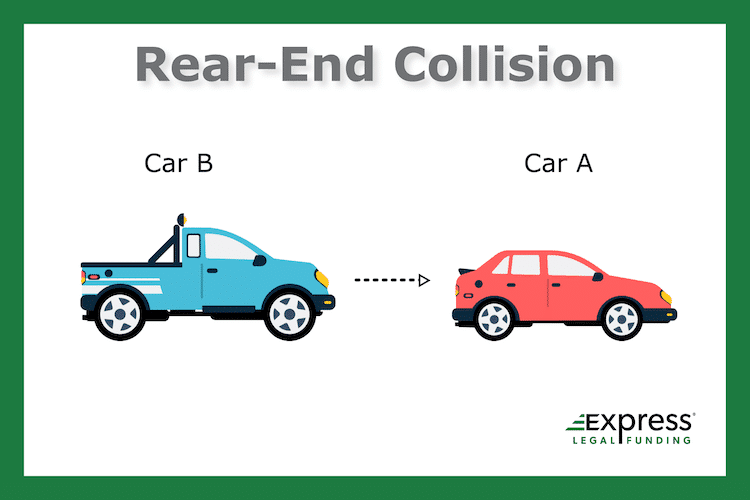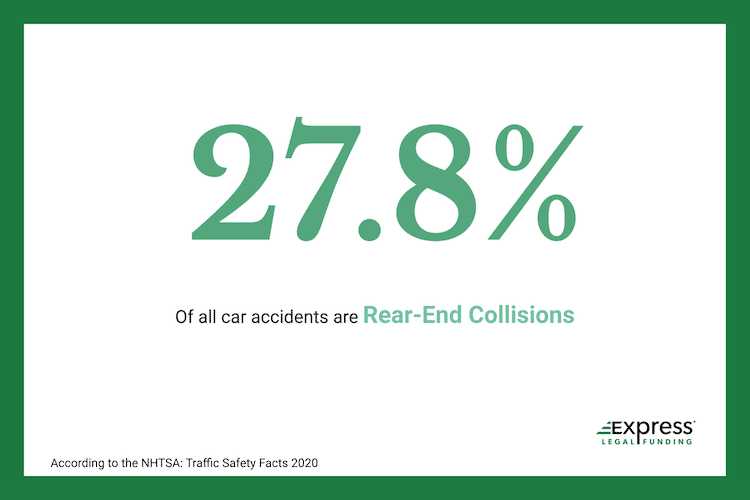
Rear-end car accidents are among the most common types of crashes, and even seemingly minor ones can cause serious injuries and major financial stress.
If you were hit from behind, you might wonder how much your rear-end collision settlement could be worth and what factors will affect your claim.
This guide breaks down everything you need to know about average rear-end settlement amounts, including what impacts compensation, common injuries like whiplash, and how working with the right attorney can help maximize your payout.
Whether you’re facing mounting medical bills, lost wages, or ongoing pain and suffering, understanding the settlement process is key to protecting your financial future.
Accident victims seek to gain more than the reimbursement costs when they file a claim and begin the personal injury case process.
What is the Average Settlement for a Rear-End Collision?
The average settlement for a rear-end collision typically ranges from $10,000 to $100,000 or more, depending on the severity of injuries, vehicle damage, and other case factors.
Minor accidents involving soft tissue injuries like whiplash often settle between $10,000 and $30,000, while cases with serious injuries, such as spinal damage or traumatic brain injuries, can result in settlements exceeding $100,000.
The final payout amount is influenced by factors like medical expenses, lost wages, pain and suffering, and the available insurance coverage.
Still, some parameters apply to most car accident claims that affect the average case value and estimated settlement amount.
- Average settlement amounts from other similar cases.
- Insurance policy limits.
- How car accident settlements are calculated.
So let’s look closer at these factors, mainly what the average settlement is worth for a rear-end accident settlement, and how the payout gets calculated.
Try our free Car Accident Settlement Calculator and get an instant estimate.
What is a Rear-End Car Accident?
A rear-end car accident occurs when one vehicle crashes into the back of another vehicle. These collisions often happen at intersections, in stop-and-go traffic, or when a driver follows another vehicle too closely.
Rear-end accidents are typically caused by driver inattention, speeding, distracted driving, or sudden stops, and they can result in injuries like whiplash, back injuries, and head trauma.
These characteristics are included in the following example:

Example of a Basic Rear-End Collision Accident:
- Two cars on the road. Car A and Car B.
- Car A is in front, waiting at a flashing red light.
- The driver in Car B is distracted and does not realize Car A is stopped ahead of them.
- Car B does not break in time behind Car A and slams directly into the rear bumper of Car A, causing a rear-end collision accident.
(When there are three or more rear-end collisions, it becomes a chain collision accident.)
What Percentage of Crashes Are Rear-End Crashes?
Rear-end collisions are the most common car accident incident to occur annually.
According to the most recent data in the Traffic Safety Report published in 2022 by the National Highway Traffic Safety Administration, rear-end crashes account for 27.8% of the total motor vehicle collisions in the United States.

How Many Accidents Are Fatal From a Rear-End Collision?
The National Highway Safety Administration (NHTSA) has also determined that the total number of fatal rear-end collisions was 2,428 as of its most recent report, which accounted for 6.8% of all fatal car crashes nationwide.
Even though rear-end collisions are far from the most deadly car crash type, they still pose a severe injury hazard.

What Happens to Your Body in a Rear-End Collision?
What happens to you (and your body) when you get rear-ended can drastically worsen based on the variables and factors involved.
The more significant the colliding vehicles’ size and velocity (speed), the more dangerous rear-end collisions become.
In general, G-force plays a significant role in car accidents and the types of injuries that can result from them.
Regarding a rear-end crash, G-force plays an even more critical role.
G-force measures the gravitational force that causes us to feel external pressure (weight) when we experience the long drops of roller coasters. It is caused by rapid acceleration or deceleration of the body.
The same G-force concepts apply when a car slams into the rear of a stopped car. Both cars’ drivers will be dealt a sudden jolt of G-force and will experience the following:
- The driver who is hit from behind will experience acceleration from no movement to quick movement.
- The driver that rear-ended the first car will experience deceleration from coming to a rapid halt, which causes injuries.
Can You Get Whiplash From Being Rear-Ended?
Yes, you can get whiplash from being rear-ended. The sudden start and sudden stop involving high speeds is what causes whiplash for drivers in a rear-end collision, which is why the classic neck injury is also called cervical acceleration/deceleration (CAD) syndrome.
The Average Settlement Amount For Rear-End Accidents
When a personal injury claim is filed for any reason, one of the main goals is securing a financial settlement that allows the victim to recover from medical expenses, property damage, and non-economic damages like pain and suffering.
While this is important, the claims are also designed to bring the plaintiff to justice for negligence on the road.
Nevertheless, understanding how much you stand to gain from litigation like this is essential to ensure you stay within your financial means.
Therefore, the question of the average payout for a rear-end car accident is reasonable, but the answer might disappoint you.
Settlements are not predetermined and are valued by certain criteria from the accident.
Therefore, there is no guarantee that you will receive a payment within an average because your injuries and the damage to your vehicle might not be substantial enough to justify that cost to the driver’s insurance company adjusters and the courtroom.
What Personal Injuries Can You Get From Being Rear-Ended?
In addition to whiplash, the most common injuries and symptoms after a rear-end car accident include:
- Back injuries, from minor lumbar (lower back) pain to herniated discs
- Shoulder and neck injuries and stiffness
- Muscle tenderness and stiffness from whiplash
- Soft tissue damage, scrapes, bruises, or cuts
- Concussions or traumatic brain injuries that advanced MRIs and new types of brain scans can discover
In some instances, the severity of a rear-end collision can be much more significant for the driver in the car that caused the accident if the car they are driving is substantially smaller than the one it collides with from behind, such as a compact car or small sedan crashing into a pickup truck.

Although rare, high-velocity impacts and the size of the vehicles involved can sometimes lead to fires, as demonstrated by a recent incident in Malaysia where a small car was completely destroyed and engulfed in flames after it crashed into the back of the other larger truck, which remained relatively intact.
Environmental factors can also contribute to the dangers of a rear-end collision.
For instance, if a vehicle is rear-ended at an intersection, the driver might inadvertently release the brake, and the impact force could propel the vehicle into oncoming traffic.
This scenario may result in multiple additional collisions, causing further damage to the vehicle and increasing the risk of injury to its occupants.
Rear-end collisions not only pose significant physical threats but can also have severe financial consequences for accident victims and their families.
Consequently, personal injury and motor vehicle lawsuits have become increasingly prevalent in the United States.
Two critical questions arise in such situations:
- Can you sue someone for rear-ending you?
- What is the average payout for a rear-end collision settlement?
We will begin by answering whether you can sue someone for a rear-end collision.
Can You Sue Someone for Rear-Ending You?
Yes, you can sue someone for rear-ending you in a car accident. As a car accident victim, it is your right to file a personal injury lawsuit against the driver who caused the rear-end collision.
Still, that does not mean it is worth suing the person who rear-ended you.
If the at-fault driver is uninsured and does not have money to provide restitution for your losses, it is likely not worth the time or expense to sue them.
The best way to determine whether that is the case in your situation is by hiring a personal injury attorney to represent you in your rear-end collision accident claim.
An expert car accident attorney can evaluate your situation and advise you on your options.
For example, in Missouri, the Missouri Tort Victims’ Compensation Fund was created for this very reason to compensate for the loss, even when the defendant has no money to pay out.
Fortunately, due to insurance, the defendant’s lack of money to sue is not the typical case regarding rear-end collisions.
If you and your personal injury attorney decide to file a claim with the court, your primary goal is to secure a financial settlement. You can be compensated for your injuries and even awarded damages, such as the following:
- Medical expenses,
- Property damage
- Non-economic damages like pain and suffering.
While this is important, the claims are also designed to bring the plaintiff to justice for negligence on the road.
Nevertheless, understanding how much you stand to gain from litigation like this is essential to ensure you stay within your financial means and do not spend money you do not have.
So let’s address question two about whether rear-end collisions have an average settlement amount and, if so, how much gets paid out.
What is the Average Payout for a Rear-End Collision?
The average settlement payout for a rear-end collision is subject to the same factors as the typical car accident case. The primary one is the total amount of your medical treatment costs.
The other factor that can limit how much your settlement can be is the insurance policy limits. While there is no set amount, your rear-end collision settlement will likely be a payout between $10,000.00 and $25,000.00 if you suffered extensive injuries.
However, this is not guaranteed since the lowest fair settlement for nominal injuries in recent history has trended around a $3,000.00 claim. It depends entirely on how the accident occurred, your injuries, and your damages.
Get a Free Consultation From a Car Accident Lawyer
We recommend establishing an attorney-client relationship by seeking a free consultation and free case evaluation from a qualified personal injury lawyer or law firm.
Fortunately, there are details you can assess to determine how close to the average you might get.
Therefore, the question of the average payout for a rear-end car accident is reasonable, but the answer might disappoint you.
Settlements are not predetermined and are valued by specific criteria from the accident.
Therefore, there is no guarantee that you will receive a payment within the range of the rear-end settlement average because your injuries and the damage to your vehicle might not be substantial enough to justify that cost to the driver’s insurance company adjusters and the courtroom.
Your Medical Expenses Affect Your Settlement Amount
The main point of consideration in a personal injury claim is the medical expenses the victim accumulates because of the accident. After a motor vehicle collision, you will almost always have some pain from your injury.
The severity might vary, but most car accidents require the victim to seek medical attention immediately.
Sometimes the injuries are minor and require only moderate treatment, but there can be serious injuries that mandate surgery and physical therapy. It depends on how severe the crash was and how badly you were injured.
Ultimately, any medical attention you seek will result in expenses that can quickly overwhelm you as more treatments are employed.
The Settlement Value Will Increase With Your Medical Costs
Medical costs are a leading concern in modern America and present a significant issue for those struggling financially. In comparison, most medical needs are involuntary and unpreventable.
The situation changes when someone else’s negligence causes your need for medical attention.
In personal injury claims, twice the total cost of your medical expenses is the baseline for what kind of car accident settlement you need.
When injuries require thousands of dollars worth of medical care, it is unrealistic to expect the average citizen to be able to finance the treatment.
That is why your demand package will require copies of all medical records and bills associated with the accident.
This gives the defendant’s insurance adjusters the necessary information to respond to your demand. Using your medical costs, they will send an offer designed to pay off the medical bills, but will try to get away with as little as possible.

How are Rear-End Car Accident Settlements Calculated?
When it comes to calculating your rear-end car accident settlement amount, your medical expenses will play a big role.
For example, accumulating $11,000.00 in medical expenses will likely lead to a settlement offer of $20,000.00 to $25,000.00 minus doctors’ liens (often reduced) and your attorney’s fee (between 33% and 40% of your case proceeds amount).
This number ensures your medical costs are addressed and provides a small sum for other property damages and missed work. The problem is that these offers are quite often not the fair settlement amount you need and deserve.
Insurance companies are for-profit companies and want to pay out as little as possible to accident victims.
Other costs arise during a personal injury claim, and the bare minimum injury settlement an adjuster offers will not cover the entirety of your loss.
Fortunately, the process allows your legal team to send a demand letter and potentially file a lawsuit asserting a more suitable rear-end accident settlement.
As long as the evidence supports the need for a larger settlement (airbags going off, bodily injury, lost income, neck pain, back pain, whether seat belts were worn, etc.) and the policy limits are high enough, it will be hard for the adjuster to ignore your claim.
Personal injury claims and the litigation process are serious civil proceedings.
As your case progresses, you will be asked to testify under oath, which means that attempting to exaggerate and lie about the extent of your injuries or the cost of your treatment is illegal.
Lying about physical injuries could cost you the car accident case altogether, so telling the truth is essential if you want to avoid running afoul of the judicial system and have a chance of recovering.
Unfortunately, this brings us to the next important detail of a personal injury claim for a rear-end collision.
Proving Fault is Essential
“Fault” is a constant factor in accident claims nationwide, determining whether the plaintiff or defendant is right.
Proving who the at-fault driver is is the plaintiff’s obligation, though there are usually signs that make it easier when dealing with motor vehicle collisions.
Your medical treatment records can typically corroborate the claims that you were injured in the incident. What they do not accomplish is prove that the auto accident was the other motorist’s fault, so you can file a successful claim.
Who is At Fault in a Rear-End Collision?
When proving who is at fault in a rear-end collision accident, it will most often be the driver who rear-ends the car in front of it. Although this is true most of the time for rear-end collisions, it is not always the case.
There are certain circumstances that place fault on the driver who was hit.
While it is true that most rear-end collisions are the rear-ender’s fault, there are scenarios where you can cause the collision even though you were in the car that got hit.
A rear-end collision is only your fault if you were driving recklessly and made the collision unavoidable for the person who hit you. This can happen if you brake for no reason and too quickly for the driver behind you to adjust.
Even then, it can be difficult for the rear-ending driver’s insurance company to prove that, and they will likely still be found to be at fault.
It will also be your fault if you shift your car’s gear into reverse and back into the vehicle behind you. Most of the time, rear-end collisions are caused by the driver behind the accident victim not paying attention or driving recklessly, so it will be their fault.
For example, you might be stopped at a red light, and the person behind you fails to notice. As a result, they crash into your vehicle despite it being legally stopped to allow the traffic light to change.
In this scenario, the person driving the other vehicle is at fault since it was their responsibility to monitor the road and adhere to traffic laws. The rear-ending driver was negligent.
When a driver is not paying attention to the road and collides with the one in front of them, it is considered negligence.
The same situation could arise when the driver is intoxicated or otherwise incapacitated. Their inability to drive safely puts them and those around them at risk and turns them into a liability.
Evidence in a Rear-End Collision Accident
That makes their actions their responsibility and cements their liability and fault. Unfortunately, there is still the issue of proof that can be difficult to acquire depending on the circumstances.
Typically, the accident can be confirmed by aligning the damage of the rear-ender’s hood to the victim’s bumper. While this can prove their vehicle hit you, it does not necessarily prove they were responsible for the collision.
This evidence is generally supplied by witness statements and nearby camera footage, depending on the severity of your injuries, the types of injuries, and the circumstances surrounding the accident.
Witnesses and Cameras From the Scene of the Accident
Witnesses at the scene of the rear-end accident usually include other drivers who were on the road at the time and nearby pedestrians. Unfortunately, this is only sometimes an option because some roads are not on well-traveled paths.
For example, back roads in the Midwest have less foot traffic and no traffic camera footage, whereas major city streets are more populated with CCTV cameras that practically record every street and sidewalk.
When witnesses and camera footage are unavailable, it is possible to use other details to determine whether one driver was likely at fault.
For example, a skilled mechanic can determine whether the damage was caused by a moving vehicle striking a stationary one and testify as an expert witness, attesting to that.
Once the evidence is gathered, it will be used to determine whether the plaintiff is indeed owed a settlement from the defendant and what is the fair settlement value.
Closing Statements on the Average Rear-End Collision Settlement
Personal injury claims for motor vehicle collisions are among the most common civil proceedings in the country. Despite our various traffic laws, thousands of rear-end collisions occur daily.
On top of that, the fact that so many types of collisions exist indicates just how dangerous motor vehicles can be and why caution must be exercised when operating one.
If you are rear-ended, you will likely experience severe injuries, especially if the collisions cause you to drift into oncoming traffic. Surviving such an accident can leave you in a financially and physically damaged state, making lawsuits a bittersweet tool.
Unfortunately, the personal injury case process can be a lengthy one that can take from a few years to a few years to resolve.
When you are short of funds and experiencing financial troubles, the longer the lawsuit lasts, the more difficult it can be to pay for the cost of daily living. With inflation and rising healthcare costs, now is more difficult than ever.
Pre-settlement Lawsuit Funding for Rear-End Accident Cases
We at Express Legal Funding realize and understand how difficult it can be to recover financially from a lawsuit when you have high medical costs, which can quickly make it difficult to keep up with even the most routine of payments, like rent and gasoline.
That is why we can offer you pre-settlement funding that will help you have enough money to pay for your essential costs so you and your attorney can focus on your personal injury case.
The money is provided as a non-recourse advance, which means the lien is placed against the potential case proceeds and not you and your personal assets.
It is not a loan but a non-recourse purchase agreement, making it risk-free for you. So if you lose your case, you do not owe us, the legal funding company, any repayment.
(Important info for Missouri consumers: Please note that the type of direct financing we can provide to injured and damaged claimants in Missouri is recourse loans and, therefore, not risk-free advances contingent upon settlement money or trial proceeds.
Pre-settlement loans and post-settlement loans in states like Missouri are credit-based recourse loans and must, technically, by law, be repaid. Express Legal Funding-Missouri, LLC is a loan company licensed to give these loans in Missouri.)
If you are short on cash during a car accident lawsuit or another civil claim where you are suing someone for money, you can visit our website to apply or call us anytime. We never charge you a penny to apply or to get approved for our nationwide lawsuit funding.
